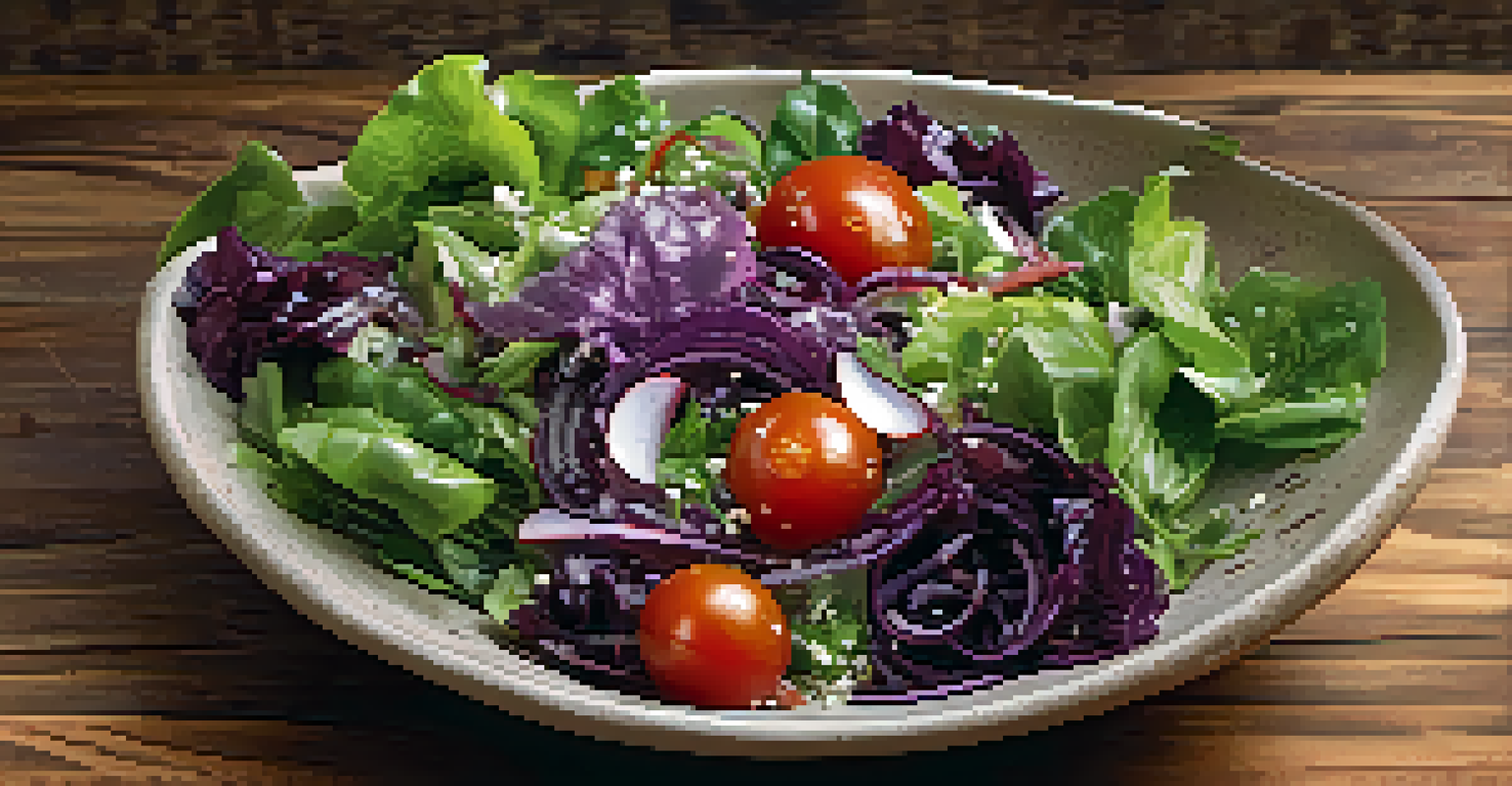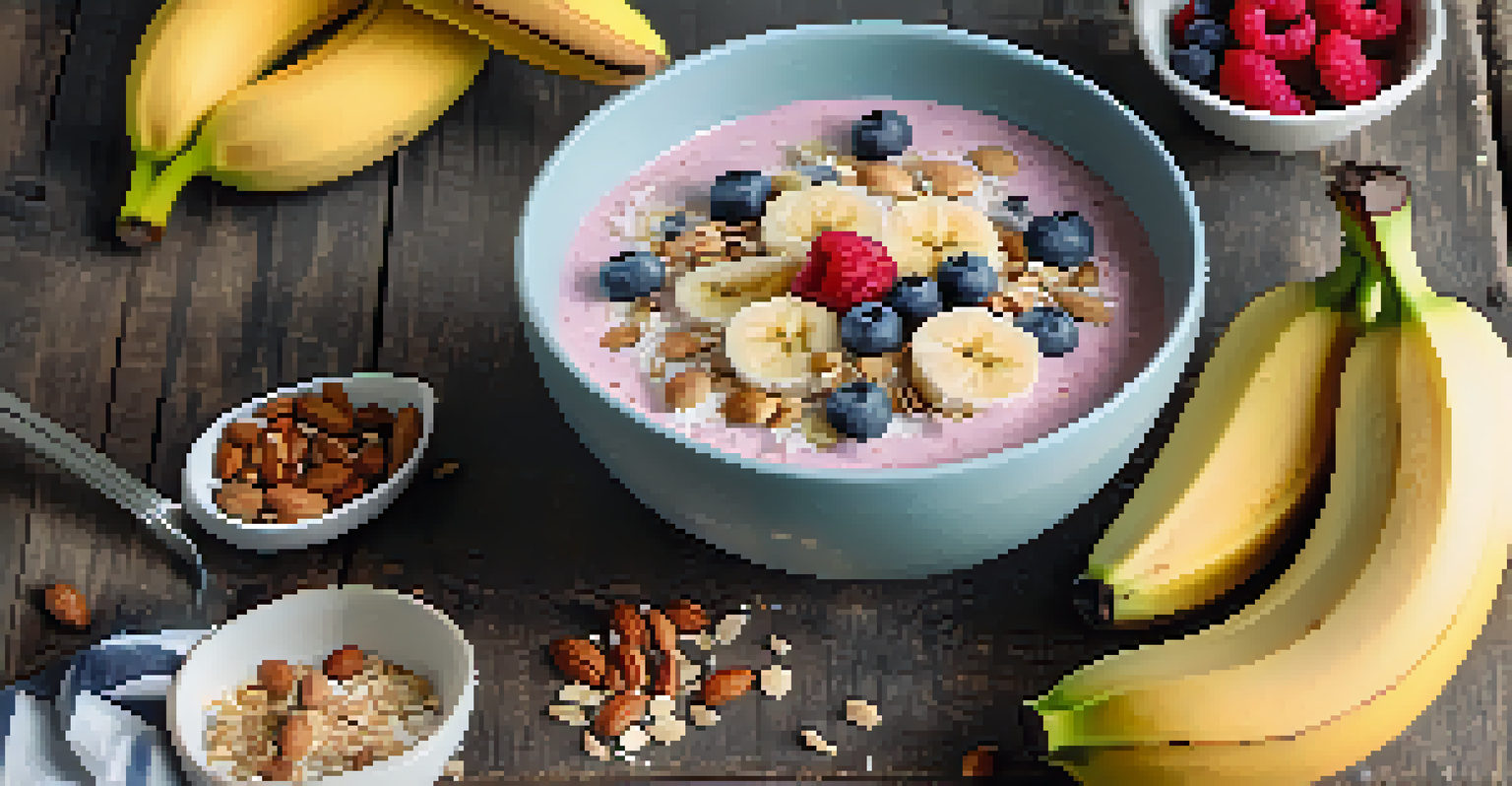Raw Foods and Digestive Health: What Science Says

Understanding Raw Foods and Their Nutritional Value
Raw foods refer to uncooked, unprocessed, and often organic fruits, vegetables, nuts, and seeds. These foods retain their natural nutrients and enzymes, which can be lost during cooking. The idea is that consuming raw foods can provide more vitamins, minerals, and antioxidants, making them a great choice for health enthusiasts.
Let food be thy medicine and medicine be thy food.
For instance, raw spinach contains more iron and calcium than its cooked counterpart. Similarly, bell peppers boast higher vitamin C levels when eaten raw. This nutritional density is often cited as a key reason people opt for a raw food diet, especially for digestive health.
Moreover, the fiber content in raw foods can aid digestion by promoting regular bowel movements. Fiber acts like a broom, sweeping through the digestive tract and helping to prevent constipation, which is crucial for maintaining overall gut health.
The Role of Enzymes in Digestion
Enzymes are proteins that facilitate biochemical reactions in the body, including digestion. Raw foods are rich in natural enzymes that can help break down food, making nutrients more accessible. When you cook foods, you often destroy these beneficial enzymes, which can hinder digestion.

For example, pineapple contains bromelain, an enzyme that helps digest protein. Consuming raw pineapple can support digestion, especially after a protein-heavy meal. This is one reason many people feel lighter and more energetic when they incorporate raw foods into their diets.
Raw Foods Boost Nutritional Value
Raw foods retain essential nutrients and enzymes that can enhance digestive health and overall wellness.
However, while raw foods provide these enzymes, the human body also produces its own digestive enzymes. Therefore, the impact of raw foods on enzyme levels can vary from person to person, depending on individual digestive health and dietary habits.
Raw Foods and Gut Bacteria: A Dynamic Relationship
The gut microbiome, a community of trillions of bacteria, plays a crucial role in digestion and overall health. Raw foods can positively influence this microbiome by providing prebiotics, which are types of fiber that feed beneficial gut bacteria. This can help maintain a balanced gut environment.
The food you eat can be either the safest and most powerful form of medicine or the slowest form of poison.
For example, foods like bananas, onions, and garlic are rich in prebiotics and are often included in raw food diets. By consuming raw, fiber-rich foods, you encourage the growth of good bacteria, which can enhance digestion and boost your immune system.
However, it's essential to note that not everyone’s gut microbiome is the same. Some individuals may experience digestive discomfort when introducing a high amount of raw foods, indicating that a personalized approach to diet is necessary.
Potential Benefits of a Raw Food Diet on Digestion
Many people report improved digestion and increased energy levels when adopting a raw food diet. This can often be attributed to the high fiber content, which helps regulate bowel movements and promotes gut health. Additionally, raw foods can lead to better nutrient absorption, further supporting digestive function.
Moreover, the emphasis on whole, unprocessed foods may encourage healthier eating patterns overall. When individuals focus on raw foods, they often consume fewer processed items, which can be detrimental to digestion due to additives and preservatives.
Enzymes Aid Digestion from Raw Foods
The natural enzymes found in raw foods can help break down nutrients, improving digestion and nutrient absorption.
That said, while many enjoy the benefits, transitioning to a raw food diet should be approached gradually. This allows your digestive system to adapt and can help prevent discomfort associated with drastic dietary changes.
Common Challenges of Raw Food Diets for Digestion
Despite the benefits, a raw food diet can pose challenges for some individuals, particularly regarding digestion. Some may experience bloating, gas, or discomfort due to the high fiber content or specific raw foods that are harder to digest. It’s essential to listen to your body and make adjustments as needed.
Certain foods, like cruciferous vegetables (think broccoli and cabbage), can be particularly tough on digestion when raw. Cooking these foods can make them easier to digest while still offering health benefits. Finding a balance between raw and cooked foods might be a more sustainable approach for many.
Additionally, some people may struggle to meet their nutritional needs solely through raw foods, particularly in terms of protein and certain vitamins. It’s crucial to ensure that your diet remains well-rounded and tailored to your specific health goals.
Expert Opinions: What the Research Says
Scientific research on raw foods and digestive health is still evolving, but many studies highlight the benefits of increased raw food intake. Research indicates that diets rich in fruits and vegetables can positively impact gut health and reduce the risk of digestive disorders. However, experts often emphasize the importance of balance.
Nutritionists suggest that while raw foods can offer significant health benefits, including better digestion, incorporating a variety of cooking methods can also enhance nutrient absorption. For instance, lightly steaming vegetables can make nutrients more bioavailable while retaining many of their health benefits.
Balance is Key in Diet Choices
While raw foods offer benefits, a balanced diet including both raw and cooked foods supports better digestion and nutritional needs.
Ultimately, the key takeaway is that while raw foods can be a valuable part of a healthy diet, they should not be the sole focus. A diverse approach to eating can support digestion and overall wellness more effectively.
Getting Started with Raw Foods for Digestive Health
If you’re considering incorporating more raw foods into your diet for better digestive health, start slowly. Introduce a few raw fruits and vegetables each day, and observe how your body reacts. This gradual approach can help you identify which foods work best for you and minimize any digestive discomfort.
Consider adding smoothies or salads to your meals, as these can be delicious and nutritious ways to increase raw food intake. Experimenting with different combinations can make the transition enjoyable and help you discover new favorite flavors and textures.

Lastly, remember that hydration is key when increasing fiber intake. Drinking plenty of water can help your digestive system process the added fiber more efficiently, making your journey into the world of raw foods both beneficial and enjoyable.